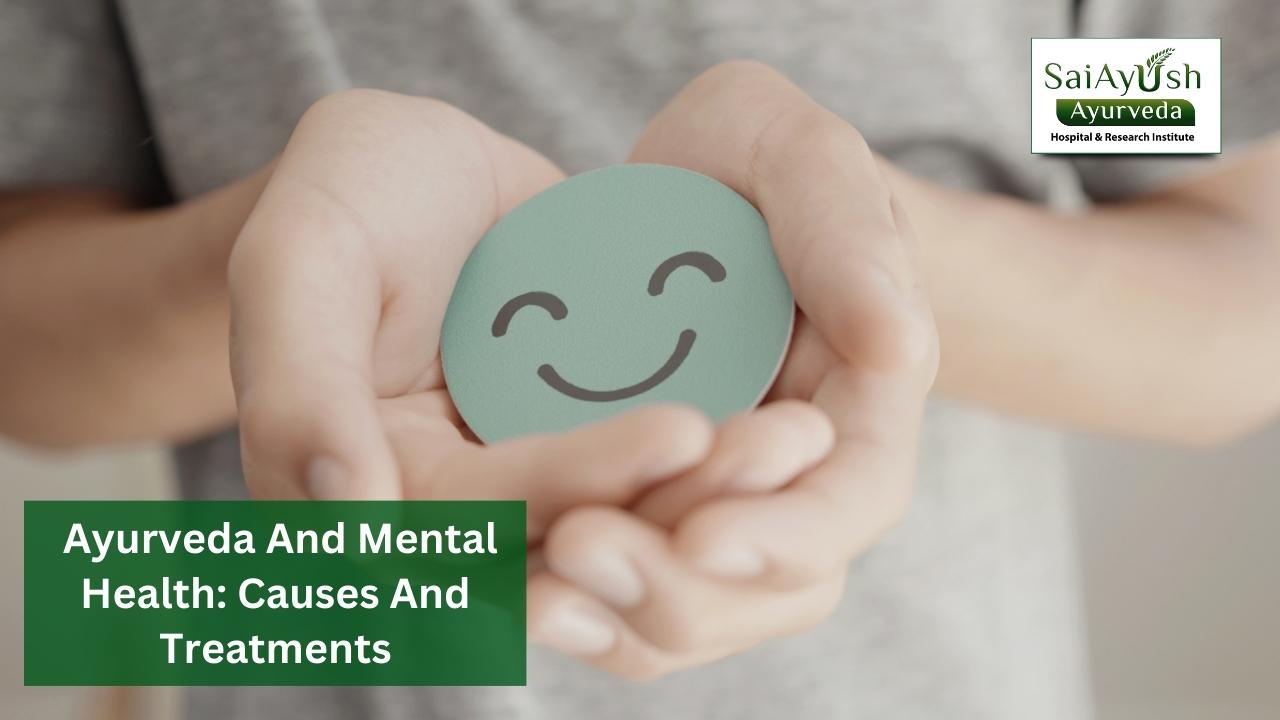Introduction Mental health problems are more common in the fast-paced world of today. Although there are effective therapies available in contemporary medicine, many people look for alternative methods to support mental health. The traditional Indian medical system known as Ayurveda provides a comprehensive strategy for mental well-being that emphasizes harmony between the mind, body, and spirit. In this blog post, we’ll examine how Ayurveda views mental health problems and look at some natural remedies that can help bring harmony and balance back. Causes of Mental Health Issues in Ayurveda Ayurveda views mental health through the lens of three doshas: Vata, Pitta, and Kapha. An imbalance in these doshas can lead to various mental health disorders. Here are some common causes of mental health issues according to Ayurveda:
- Vata Imbalance:When the Vata dosha is dominant or aggravated, it can lead to anxiety, restlessness, and insomnia. This imbalance is often associated with excessive stress, irregular daily routines, and a lack of routine self-care practices.
- Pitta Imbalance:An excess of Pitta dosha can manifest as irritability, anger, and aggression. It is often linked to excessive competitiveness, perfectionism, and exposure to intense environments.
- Kapha Imbalance: A dominant Kapha dosha may lead to feelings of lethargy, depression, and emotional stagnation. This imbalance can be caused by a sedentary lifestyle, overindulgence in comfort foods, and lack of stimulation.
- Ama Accumulation:According to Ayurveda, the accumulation of ama, or toxins, in the body can disrupt mental health. Ama is formed due to improper digestion and lifestyle choices, leading to a foggy mind and emotional instability.
Natural Ayurvedic Treatments for Mental Health Diet and Nutrition:
- Follow a dosha-balancing diet: Ayurveda recommends a diet tailored to your unique dosha constitution. For example, individuals with Vata imbalances should favor warm, nourishing foods, while those with Pitta imbalances should consume cooling and hydrating foods.
- Include herbs and spices: Incorporate Ayurvedic herbs and spices known for their calming and stress-reducing properties. These may include Ashwagandha, Brahmi, Tulsi (Holy Basil), and Jatamansi.
- Avoid processed foods and excessive caffeine: Processed foods and excess caffeine can disrupt the mind and lead to imbalances. Opt for whole, unprocessed foods and limit caffeine intake.
Yoga and Meditation:
- Practice yoga asanas:Certain yoga postures can help balance doshas. For example, grounding poses like Tadasana (Mountain Pose) and Vrksasana (Tree Pose) can be beneficial for Vata imbalances, while cooling poses like Shashankasana (Rabbit Pose) can help Pitta imbalances.
- Mindful meditation: Regular meditation practice can reduce stress and promote mental clarity. Techniques such as mindfulness meditation or transcendental meditation are often recommended.
Daily Routine (Dinacharya):
- Establish a consistent daily routine: Ayurveda emphasizes the importance of maintaining a regular schedule for waking up, eating, and going to bed. This routine helps synchronize the body’s internal clock with natural circadian rhythms.
- Oil massage (Abhyanga): Self-massage with warm, herbal oils can soothe the nervous system and promote relaxation.
Herbal Remedies:
- Ashwagandha: Known for its adaptogenic properties, Ashwagandha is a popular Ayurvedic herb that helps reduce stress and anxiety while improving overall mental well-being.
- Brahmi: Brahmi is known to enhance cognitive function, memory, and concentration. It is often used to support mental clarity.
- Jatamansi: This herb has calming effects on the mind and is used to alleviate anxiety, restlessness, and insomnia.
Panchakarma Therapy:
- In Ayurveda, panchakarma is a rejuvenation and purification treatment. In order to remove toxins from the body, it involves procedures including oil massages, herbal steam therapy, and enemas. A Panchakarma regimen might assist in reviving the mind and balancing the doshas.
Sattvic Lifestyle:
- Embrace a Sattvic lifestyle: Sattva is one of the three gunas (qualities of nature) in Ayurveda, representing purity, balance, and harmony. Living a Sattvic lifestyle involves consuming Sattvic foods (pure and clean), engaging in positive activities, and fostering a peaceful and loving environment.
Consult an Ayurvedic Practitioner:
- It’s important to consult a qualified Ayurvedic practitioner who can assess your individual constitution and imbalances and provide personalized recommendations. Ayurveda is highly individualized, and the treatment approach may vary from person to person.
Lifestyle and Mindfulness:
- Avoid overstimulation: Limit exposure to excessive screen time, loud noises, and crowded environments, which can aggravate Vata and Pitta imbalances.
- Cultivate mindfulness: Develop a regular mindfulness or self-awareness practice to connect with your inner self and reduce stress.
Conclusion Ayurveda provides a holistic approach to mental health that addresses the root causes of imbalances in the mind and body. By understanding and harmonizing the doshas, adopting a balanced diet, incorporating yoga and meditation, following a disciplined daily routine, and utilizing herbal remedies, individuals can promote mental well-being naturally. It is important to consult a qualified Ayurvedic practitioner to personalize treatments based on individual constitution and specific mental health concerns. With its time-tested wisdom, Ayurveda offers a valuable complement to modern approaches in nurturing mental health and achieving overall well-being.
Discover the healing power of Ayurveda with our latest article at Sai Ayush Ayurveda Hospitals! Dive into the age-old wisdom that can rejuvenate your body and mind. Click here to read more:



0 Comments